I've got a class I wrote to work with the front end (web browser side) of a shopping cart.
It's fairly simple in that I send the class a product ID that I bury in the URL and then query a database populating the classes variables for use in retrieving the data through some public methods.
To interface with my actual physical web page I have a file I call viewFunctions.php. Wherein I instantiate my class called ItemViewPackage():
<?php
require_once(dirname(__FILE__) . '/ItemViewPackage.php');
$viewObject = new ItemViewPackage($_GET['page']);
So, I have shoppingcartpage.php (the physical url) that requires the file viewFunctions.php that loads my class ItemViewPackage().
The output page shoppingcartpage.php calls functions like get_item_info('title') or get_item_info('price') which in the viewFunctions.php file is made like so:
function get_info($type){
echo $viewObject->get_info($type);
}
Now, right off the bat, this isn't working because, I assume, $viewObject is not global. So I make $viewObject global like so:
function get_info($type){
global $viewObject;
echo $viewObject->get_info($type);
}
But, this doesn't work either, I still get an error for "Call to a member function get_info() on a non-object"
Now, the only thing that works is:
function get_info($type){
$viewObject = new ItemViewPackage($_GET['page']);
echo $viewObject->get_info($type);
}
But, I don't want to re-instantiate my object every time I make a call to this function (which is several times for several bits of information). I'd rather instantiate once at the top of my viewFunctions.php doc and use that object every time I call this function.
Am I going about this completely wrong?
Thanks in advance. DIAGRAM (hopefully it helps visualize)

